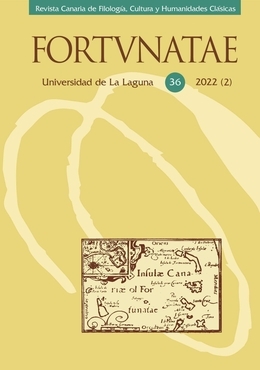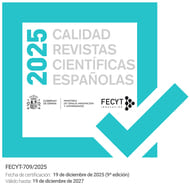Louise Glück’s «Persephone the Wanderer» read from a psychoanalytic and Classical Receptions perspective
Resumen
Louise Glück proporciona un ejemplo convincente de Recepciones Clásicas en la poesía contemporánea. Por lo tanto, este artículo tiene como objetivo abordar la interpretación psicoanalítica de Glück del llamado Himno homérico a Deméter y «Persephone the Wanderer» («Perséfone la errante»), poema perteneciente al Averno de Glück (2006), que intenta demostrar la apropiación del mito de Deméter y Perséfone desde una perspectiva psicoanalítica. Después de una introducción al Himno homérico a Deméter (Foley, 1994), y a Louise Glück y su poema «PersephonetheWanderer», compararé el mito de Deméter y Perséfone en el Himno homérico a Deméter con «Persephone the Wanderer» de Glück. Desde una perspectiva psicoanalítica, se abordará el estado psicológico de Deméter señalando su maternidad y su duelo, y luego se asociará el concepto de narcisismo tanto a Deméter como a Hades en el poema de Glück y su impacto en Perséfone.
Citas
ARTHUR, M. (1977): «Politics and Pomegranates: An Interpretation of the Homeric Hymn to Demeter», Arethusa 6: 7-58.
BURKET, W. (1983): Homo Necans, Trans. P. BING, Cambridge, Mass. [Originally published in Berlin, 1977]. COOKE, A. (2017): «The Poetry of Louise Glück: The Search for a Feminine Self through the Lens of Kristevan Psychoanalytic Feminist Literary Theory», Papers & Publications: Interdisciplinary Journal of Undergraduate Research 6: 27-36.
DAIFOTIS, M. (2017): The Myth of Persephone: Body Objectification from Ancient to Modern, CMC Senior Theses, Claremont.
DINGS, F. (2008): «Louise Glück. Averno», World Literature Today 82 (2): 72-73.
DE VIDO, S. (2006): «Lacus Avernus», in H. CANCIK et al. (eds.), Brill’s New Pauly, Antiquity volumes, Venice. DOI: http://dx.doi.org/10.1163/1574-9347_bnp_e628060 [accessed 10/02/2022].
EL BAKARY, I. F. M. (2019): «Half in love with easeful Death’: The Mythopoetics of Louise Glück’s AVERNO», Journal of Scientific Research in Arts 9: 126-146.
FLETCHER, J. (2019): Myths of the underworld in contemporary culture: The Backward Gaze, Classical Presences, Oxford University Press, Oxford - New York.
FOLEY, H. P. (ed.) (1994): The Homeric Hymn to Demeter. Translation, Commentary, and Interpretive Essays, Princeton University Press, Princeton.
FRANKEL, V. E. (2016): «From Persephone’s Lips: Three Retellings by Louise Glück», in C. S. HARRIS et al. (eds.), Women versed in myth: essays on modern poets, McFarland & Company, Inc. Publishers, Jefferson, North Carolina, pp. 43-49.
FREUD, S. (1914): On Narcissism: An Introduction, Hogarth Press, London.
GLUCK, L. (2006): Averno, Carcanet, Manchester.
GOSMANN, U. (2010): «Psychoanalyzing Persephone: Louise Glück’s Averno», Modern Psychoanalysis 35: 219-239.
HARRIS, W. V. (ed.) (2018): Pain and pleasure in classical times, Brill, Leiden.
HURST, I. (2012): «‘Love and blackmail’: Demeter and Persephone», Classical Receptions Journal 4 (2): 176-189.
HURST, I. (2022): «An autumnal underworld: Louise Glück’s Averno», Letteratura e Letterature 16: 75-85.
MORALES ORTIZ, A. (2007):«La maternidad y las madres en la tragedia griega», in E. A. CALDERÓN et al. (eds.), La madre en la Antigüedad: literatura, sociedad y religión, Signifer, Madrid, pp. 129-167.
MORRIS, D. (2006): The Poetry of Louise Glück: A Thematic Introduction, University of Missouri Press, Missouri.
RAYOR, D. J. (2004): The Homeric Hymns: A Translation, with Introduction and Notes, University of California Press, Berkeley.
RICHARDSON, N. (1974): The Homeric hymn to Demeter, Clarendon Press, Oxford.
RICHARDSON, N. (2011): «The Homeric hymn to Demeter. Some Central Questions Revisited», in A. FAULKNER (ed.), The Homeric Hymns. Interpretative Essays, Oxford University Press, Oxford, pp. 54-58.
ROISMAN, J. (2011): Ancient Greece from Homer to Alexander: the evidence, Wiley-Blackwell, New Jersey.
SALCEDO GONZÁLEZ, C. (2020): «El mito de Perséfone y el conflicto de la maternidad en Mother love, de Rita Dove», Journal of Feminist, Gender and Women Studies 9: 33-39.
SUTER, A. (2002): The Narcissus and the Pomegranate. An Archaeology of the Homeric Hymn to Demeter, University of Michigan Press, Michigan.
UžGIRIS, R. (2020): «Unexpected Laureate: Louise Glück in Lithuania», Vertimo Studios 13: 89-109.
Los autores conservan los derechos de autor y garantizan a la revista el derecho de ser la primera publicación del trabajo al igual que licenciarlo bajo una Creative Commons Attribution License que permite a otros compartir el trabajo con un reconocimiento de la autoría del trabajo y la publicación inicial en esta revista.
Los autores pueden establecer por separado acuerdos adicionales para la distribución no exclusiva de la versión de la obra publicada en la revista (por ejemplo, situarlo en un repositorio institucional o publicarlo en un libro), con un reconocimiento de su publicación inicial en esta revista.






